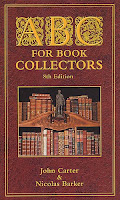AMERICANA
Books, etc., about, connected with or printed in America, often, but not exclusively, the United States of North America; or relating to individual Americans: as distinct (properly, though nowadays not invariably) from books by American writers. The Columbus Letter is a piece of
Americana, as describing the discovery of the continent; the Bay Psalm Book, as the first known book printed in what is now U.S.A.; and Thomas Paine ’s Common Sense, as one of the influential documents of the War of Independence. Poe ’s The Raven, on the other hand, is not Americana, nor is Hemingway’s A Farewell to Arms. Mark Twain’s Huckleberry Finn or Thoreau’s A Week on the Concord and Merrimack Rivers might be considered borderline cases, for if they are primarily outstanding works of American literature, they are also classically descriptive of the countryside and life of the people.
A currently fashionable sub-category should be mentioned: Western Americana. This embraces any piece of manuscript or printed matter documenting or deriving from the great westward expansion of the United States in the 19th century, from Lewis & Clark and the Louisiana and Gadsden Purchases down to Buffalo Bill and Frederic Remington. More local enthusiasms are reflected in other neologisms, such as Texana or Californiana.
Since Canada, Mexico, Central and South America are just as much part of the hemisphere as the United States, and since their ana have keen collectors, the implicit limitation in terms like ‘Latin Americana’ is beginning to break down. This catholic view has been enhanced by the publication, begun under the editorship of the late Mr John Alden, of European Americana, a catalogue of generous comprehension, as applied in the collection of the John Carter Brown Library, Providence, R.I.
Previous ABC’s of Book Collecting posts
Carter, John & Nicolas Barker
ABC’s of Book Collecting. 8th Edition
New Castle, Delaware : Oak Knoll Press, 2004

